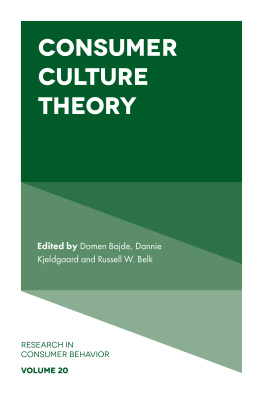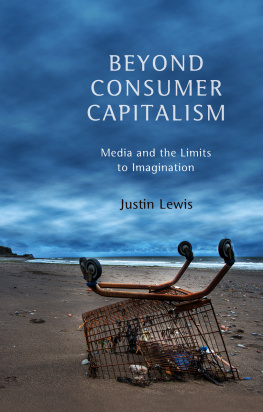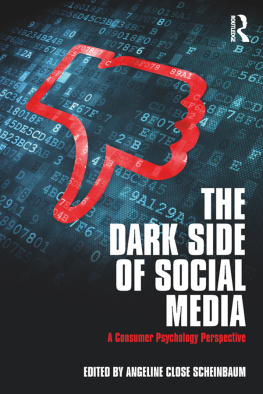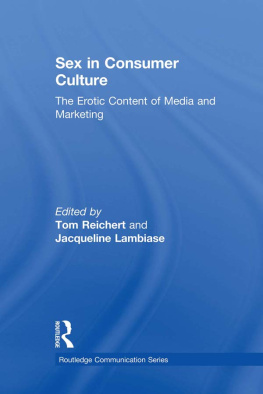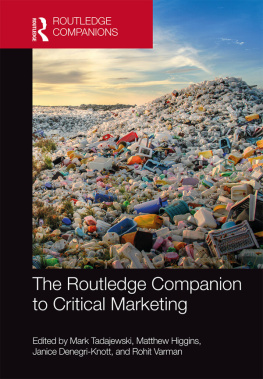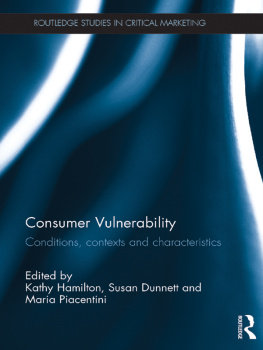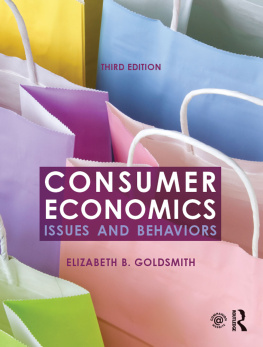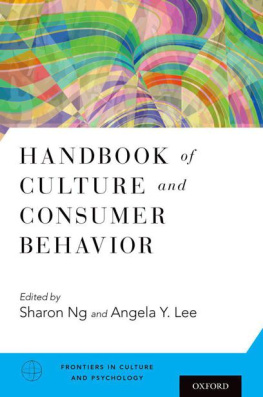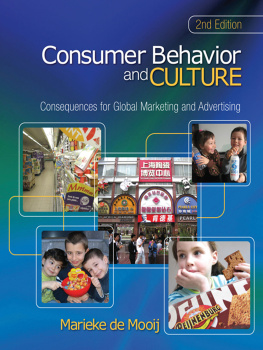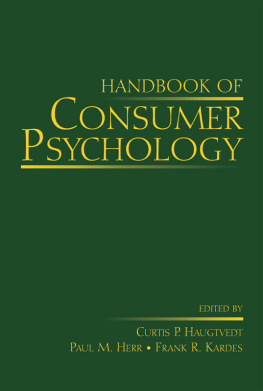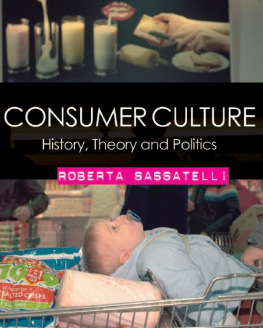CONSUMER CULTURE THEORY
RESEARCH IN CONSUMER BEHAVIOR
Series Editor: Russell W. Belk
Recent Volumes:
Volumes 114: Research in Consumer Behavior
Volume 15: Consumer Culture Theory
Volume 16: Consumer Culture Theory
Volume 17: Consumer Culture Theory
Volume 18: Consumer Culture Theory
Volume 19: Consumer Culture Theory
RESEARCH IN CONSUMER BEHAVIOR VOLUME 20
CONSUMER CULTURE THEORY
EDITED BY
DOMEN BAJDE
University of Southern Denmark, Denmark
DANNIE KJELDGAARD
University of Southern Denmark, Denmark
RUSSELL W. BELK
York University, Canada

United Kingdom North America Japan
India Malaysia China
Emerald Publishing Limited
Howard House, Wagon Lane, Bingley BD16 1WA, UK
First edition 2019
Copyright 2019 Emerald Publishing Limited
Reprints and permissions service
Contact:
No part of this book may be reproduced, stored in a retrieval system, transmitted in any form or by any means electronic, mechanical, photocopying, recording or otherwise without either the prior written permission of the publisher or a licence permitting restricted copying issued in the UK by The Copyright Licensing Agency and in the USA by The Copyright Clearance Center. Any opinions expressed in the chapters are those of the authors. Whilst Emerald makes every effort to ensure the quality and accuracy of its content, Emerald makes no representation implied or otherwise, as to the chapters suitability and application and disclaims any warranties, express or implied, to their use.
British Library Cataloguing in Publication Data
A catalogue record for this book is available from the British Library
ISBN: 978-1-78754-286-0 (Print)
ISBN: 978-1-78754-285-3 (Online)
ISBN: 978-1-78754-287-7 (Epub)
ISSN: 0885-2111 (Series)

CONTENT
Domen Bajde, Dannie Kjeldgaard and Russell W. Belk
PART I
OBJECTS AND THEIR DOINGS
Stphane Borraz
Luciana Walther
Henna Syrjl and Anu Norrgrann
Omar Khaled Abdelrahman, Emma Banister and Daniel Hampson
PART II
GLOCALIZATION
Hela Zouaoui and Fatma Smaoui
Anuja Pradhan, Hayley Cocker and Margaret K. Hogg
Virginia N. Mwangi, Hayley L. Cocker and Maria G. Piacentini
PART III
CONSTITUTING MARKETS
Stefan Schwarzkopf
Lydia Ottlewski, Johanna F. Gollnhofer and John W. Schouten
Olga Gurova
Cristina Galalae, Julie Emontspool and Omid Omidvar
PART IV
QUOTH THE RAVEN
Stephen Brown
LIST OF CONTRIBUTORS
Omar Khaled Abdelrahman University of Manchester, UK
Domen Bajde University of Southern Denmark, Denmark
Emma Banister University of Manchester, UK
Russell W. Belk Schulich School of Business, York University, UK
Stphane Borraz EDC Paris Business School, France
Stephen Brown Ulster University, Northern Ireland
Hayley L. Cocker Lancaster University, UK
Julie Emontspool University of Southern Denmark, Denmark
Cristina Galalae Coventry University, UK
Johanna F. Gollnhofer University of Southern Denmark, Denmark
Olga Gurova Aalborg University, Denmark
Daniel Hampson University of Manchester, UK
Margaret K. Hogg Lancaster University, UK
Dannie Kjeldgaard University of Southern Denmark, Denmark
Virginia N. Mwangi Lancaster University, UK
Anu Norrgrann Hanken School of Economics, Finland
Omid Omidvar Aston University, UK
Lydia Ottlewski University of St. Gallen, Switzerland
Maria G. Piacentini Lancaster University, UK
Anuja Pradhan Lancaster University, UK
John W. Schouten Memorial University of Newfoundland, Canada
Stefan Schwarzkopf Copenhagen Business School, Denmark
Fatma Smaoui University of Tunis, Tunisia
Henna Syrjl University of Vaasa, Finland
Luciana Walther Federal University of Sao Joao Del Rei, Brazil
Hela Zouaoui University of Tunis, Tunisia
LIST OF FIGURES
Chapter 3
Chapter 4
Chapter 5
Chapter 7
LIST OF TABLES
Chapter 1
Chapter 3
Chapter 5
Chapter 6
Chapter 7
Chapter 11
INTRODUCTION CONSUMER CULTURE FAIRY TALES
Domen Bajde, Dannie Kjeldgaard and Russell W. Belk
This volume presents a selection of competitive papers submitted to the 13th Consumer Culture Theory (CCT) Conference held in Odense, Denmark, June 28 to July 1. This years conference witnessed a very strong set of submissions. Despite being persistently interrupted by quothful ravens, we managed to select a dozen papers to feature in this volume. Given the conferences thematic emphasis on storytelling we aimed to select chapters that would tell stories that open our eyes and minds to new ideas, theories, and contexts.
The papers selected for this volume are presented along three narrative lines that were prevalent during the conference, and which to some extent also reflect the tradition of CCT inspired research in Odense. The first thematic part, Objects and Their Doings, reflects a research theme in CCT and elsewhere, that has developed over the last decade or so, namely, research on materiality and object agency informed by the traditions such as Actor-network theory, assemblage theory, and post-humanist perspectives.
We open this part with a chapter on ritual doings. Borraz investigates a romantic ritual in which material objects and sites (i.e., locks, bridges, and railings) play a central role. His study of love-lock pilgrimage unravels how love becomes enacted as a sacred and enduring reality through variable, yet patterned and loosely scripted assemblages of mythology, materiality, and performance. The second chapter in this part by Walther, investigates erotic consumption cycles as co-constituted by subjects and objects, exploring the agency of objects upon the consumption subject and vice versa. Furthermore, Walther explores how erotic products change meaning and agency through the consumption cycle through repurposing and personification. This is followed by Syrjl and Norrgranns chapter, which investigates the distribution and fluctuation of agency across the multiple actants that enact the home. Rather than providing a (yet another) demonstration of the agency of objects, the authors investigate the ways in which agency is shared among human and non-human entities (i.e., objects and pets), and the manner in which the power of these actants oscillates. While the final chapter of the part, authored by Abdelrahman, Banister, and Hampson, does not explicitly focus on object agency and power, it does touch upon the power, and the vulnerability, of objects. Namely, the authors stress that the power, and the need, of historic objects to compel people to care for them, are greater than previously recognized. Their study of vintage traders explains why and how people become guardians of historic objects that are not their family heirlooms. The chapter, thereby, nicely complements the previous two chapters in this part by unpacking the human commitment and work required for (social) preservation of objects.

